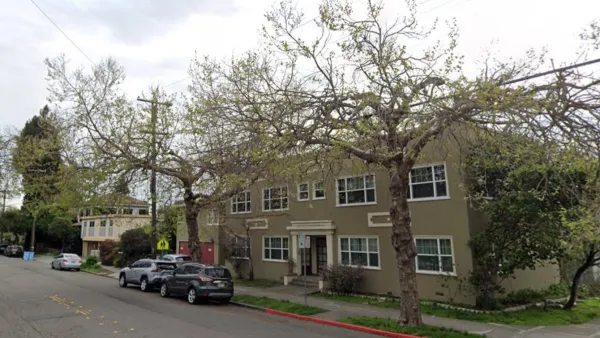Dorothy Walker has spent decades working to eliminate housing discrimination. In February, the city council finally agreed.

Nathanael Johnson profiles Dorothy Walker, a Berkeley resident who, decades ago, undertook a fight against racist real estate covenants. As a white woman married to a Japanese-American, Walker witnessed the effects of internment and race-based policies in mid-century America, policies which reverberate to this day.
Despite federal efforts to eliminate housing segregation in the early 20th century, writes Johnson, cities found new ways to replace explicitly racist covenants with "ordinances that entrenched segregation by income and wealth instead, reserving certain parts of town for people who could afford their own house and a roomy yard." Walker has proposed eliminating single-family zoning for decades, but her proposals have always fallen on deaf ears. "I was basically a voice in the wilderness crying out for density," she says. "It was just so radical. It fell like a stone."
As the years wore on, Berkeley residents "moved to clamp down" on any efforts to revise zoning codes or increase density. "In 1973, Berkeley’s residents put what they called the “Neighborhood Preservation Ordinance” on the ballot to make it harder to demolish old buildings and build new ones."
At 90, "Walker had not expected to live long enough to see Berkeley end single-family zoning." When the city council voted to eliminate single-family zoning in February of this year, the move broke open a decades-old fight and vindicated advocates like Walker. However, "the February vote merely put the City Council on the record as supporting the reforms. To turn [Councilmember and Vice Mayor Lori] Droste’s resolution into reality, and end single-family zoning a century after Berkeley created it, council members must grapple with the details."
"Housing experts agree that loosening zoning won’t bring down Berkeley’s stratospheric housing prices." According to Karen Chapple, city planning professor at UC Berkeley, "There’s no hope; it will never be affordable again.' But making it possible for more people to live in the city, she said, would put less pressure on residents to flee to surrounding cities and tamp down the growth of sprawling exurbs."
FULL STORY: Zoned out: One woman’s half-century fight to desegregate Berkeley

Planetizen Federal Action Tracker
A weekly monitor of how Trump’s orders and actions are impacting planners and planning in America.

Maui's Vacation Rental Debate Turns Ugly
Verbal attacks, misinformation campaigns and fistfights plague a high-stakes debate to convert thousands of vacation rentals into long-term housing.

San Francisco Suspends Traffic Calming Amidst Record Deaths
Citing “a challenging fiscal landscape,” the city will cease the program on the heels of 42 traffic deaths, including 24 pedestrians.

Amtrak Rolls Out New Orleans to Alabama “Mardi Gras” Train
The new service will operate morning and evening departures between Mobile and New Orleans.

The Subversive Car-Free Guide to Trump's Great American Road Trip
Car-free ways to access Chicagoland’s best tourist attractions.

San Antonio and Austin are Fusing Into one Massive Megaregion
The region spanning the two central Texas cities is growing fast, posing challenges for local infrastructure and water supplies.
Urban Design for Planners 1: Software Tools
This six-course series explores essential urban design concepts using open source software and equips planners with the tools they need to participate fully in the urban design process.
Planning for Universal Design
Learn the tools for implementing Universal Design in planning regulations.
Heyer Gruel & Associates PA
JM Goldson LLC
Custer County Colorado
City of Camden Redevelopment Agency
City of Astoria
Transportation Research & Education Center (TREC) at Portland State University
Jefferson Parish Government
Camden Redevelopment Agency
City of Claremont





























